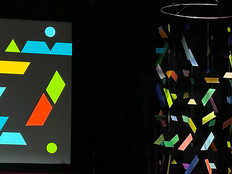10 Innovative IT Projects to Inspire You This Fall
One of the coolest things about working in higher education is that it attracts, by and large, smart, curious professionals who are interested in how things work — and how to make them better.
IT experts, administrators and academics are often at the forefront of solving society’s problems, and emerging technologies are making their toolkits more interesting every day.
Check out the impressive work that’s happening on campuses around the country. They just might spark the next great idea for yours.
1. The Pulse Quickens on the Internet of Things
If smart cities are the next iteration of citizen services, smart campuses won’t be far behind. Powered by Internet of Things technologies such as sensors and Wi-Fi, the coming wave will take data-driven planning to a whole new level. At research centers in Wisconsin, Georgia, Indiana and elsewhere, academics and technologies are mapping and advancing potential applications. One example: Indiana University and University of Washington researchers are on a National Science Foundation project to plug security weaknesses in IoT devices in the home.
2. From Pipe Dream to Production at Ivy Tech
Every campus can use fresh solutions to old problems. Ivy Tech Community College gets them via its annual Innovation Day, pairing individuals with coaches to develop proposals for new ideas that benefit the campus community. This year, innovators presented 35 proposals to a team of judges, which chose 12 to advance to in-person presentations. The winners netted $5,000 to $15,000 to create a new crowdsourcing strategy, a weather balloon instrumentation cluster, a student care package program, video lecture technology and an online anatomy prep course.
3. Technology Through a Different Lens
Tech has always been closely tied to the sciences, but it’s now becoming more multidisciplinary. From ethicists to urban planners, experts with their own brand of expertise are making technologies richer and more robust. Among them, 21 institutions (including Arizona State University, Carnegie Mellon University, Georgia Tech, Harvard University, Princeton University and Stanford University) have formed the Public Interest Technology University Network. Their mission combines education, philanthropy and public policy to define and build the public interest technology sector.
4. Carnegie Mellon Celebrates 40 Years of Robotics
Map mine disaster scenarios? Create autonomous aerial films? Program a visual knitting machine? That’s just a slice of the activity at the Robotics Institute at Carnegie Mellon University. Founded in 1979, the institute is still on the bleeding edge. It has big ideas and big space, with more than 200,000 square feet plus 40 acres of field space for testing and development. It also boasts 10 A.M. Turing Award winners and more than 100 sponsored research projects. Forty years in, this remains a research center to watch.
5. University of Chicago Opens Doors to Education
Everyone wants to expand access and affordability in higher education. UChicago Empower launched a new program this fall to help close that gap. It seeks to level the playing field with free technology and greater flexibility in the admissions process (video interviews can replace in-person interviews, for example). It expands financial support, on-campus programs and online resources for first-generation college students, as well as those from rural areas and underrepresented groups.
MORE FROM EDTECH: Here are four models universities are using to reinvent higher education.
6. MIT Revs Up the Satori Supercomputer
IBM gave MIT one heck of a back-to-school present: a $11.6 million computer cluster modeled on Summit, the supercomputer that IBM built for the U.S. Department of Energy at the Oak Ridge National Laboratory. The new powerhouse, which should be up and running this fall, can perform 2 quadrillion calculations per second — ample speed to let researchers at the MIT Stephen A. Schwarzman College of Computing run elaborate artificial intelligence models. The cluster is named Satori, a Buddhist term for enlightenment.
7. Colleges Apply Agile Thinking to Student Success
Can predictive analytics be used to help students at institutions researching the technology? The University of Maryland University College hopes so. Its Center for Innovation in Learning and Student Success partners up with academic and business units on campus to identify, test and evaluate the best ways to help students reach their goals — including making it to graduation. Center staffers are constantly evolving their work, using rapid prototyping and pilot projects to find the best solutions.
8. STEM, Powered by Imagination
We know education in science, technology, engineering and mathematics is crucial for jobs in our increasingly automated society, but let’s not overlook the value of creativity. In a recent survey of 1,600 educators, along with 400 policymakers and influencers, Adobe found that tomorrow’s economy will depend on creative problem-solving. One place that’s ahead of the curve: the University of Southern California Institute for Creative Technologies, which turns 20 this year. What started as a Department of Defense and Army initiative is now a leader in areas such as human performance and game-based training. The institute’s unique blend of science and storytelling has driven its success — and could be a harbinger of the future. A similarly intriguing mix of disciplines drives Arizona State University’s Center for Science and the Imagination.
9. Esports Is Still the Hottest New Game on Campus
In a recent survey of 281 K–12 and higher education leaders, Extreme Networks and eCampus News found that 1 in 5 schools already have an esports program. Among those that don’t, 71 percent are considering one. Southern Illinois University Carbondale just opened a new esports arena in August, as did Lawrence Technological University. On the professional end, Las Vegas, Philadelphia and South Bend, Ind., will soon open esports arenas. College esports has its own coaches, scholarships and majors for aspiring managers. This trend shows no signs of slowing down.
10. Rethinking Reality at the University of Arkansas
The Emerging Analytics Center at the University of Arkansas Little Rock is a hub of invention for all things virtual reality and augmented reality. Interdisciplinary teams use technology, infrastructure and application development to create wonders such as TopoCollo, a VR-enabled, interactive map; a networked HoloLens operation; an AR-guided repair and maintenance procedure for engines; and “Anatomical Eyes,” an interactive installation that lets users dissect a virtual human body. The center hosted Arkansas’ first National Computer Science Summit for State Leaders this summer.









